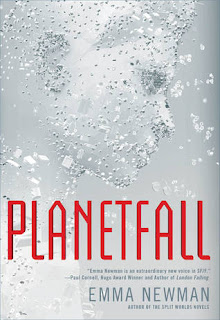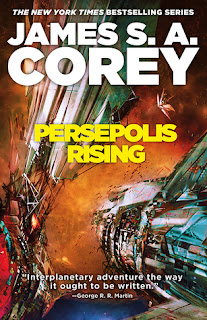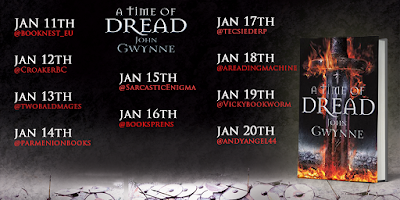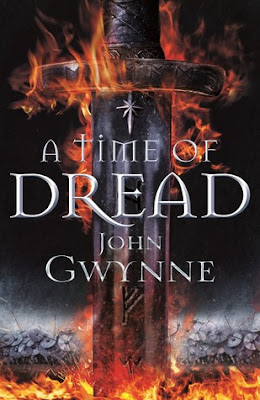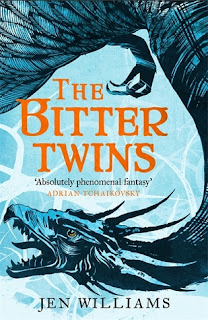Iron Gold is the fourth in Pierce Brown’s ‘Red Rising’
series. It takes place several years after the previous trilogy, showing both
us and the characters what happens after a war for liberation is won. It’s not
all roses, by any means.
The universe of Iron Gold is distinct from that of the
precursor series. The Golds, mankind’s erstwhile masters, have been driven to
the core and edge of the solar system. In between, a Republic rules. The
society of the outer Golds is one which can evoke some sympathy. Where previous
entries gave us sybaritic rulers, interested more in their rights than their
assumed responsibilities, those at the boundaries of things hold to a different
moral aesthetic. If they still regard the other classes of their population as
inferior, they do so with a sense of parental duty, forces of occasionally
brutal guidance, rather than feckless waste. These are the Iron Golds, those
who are prepared to back their claim to superiority in blood and fire, and
accept that loyalty is a two way street. They’re sympathetic, to some degree,
with the courage of their convictions and a willingness to see them through.
By contrast, the Republic, founded by the heroes of the
series prior – Darrow and the rest – is something of a lame duck. Or perhaps a
sick horse. A senate packed with jobsworths and useful connections debates the
worth of further war whilst being insulated from it, while the military looks
to its commanders for instructions, and for leadership if the orders it’s given
aren’t the right ones. Pierce Brown crafts a convincingly fledgling republic
out of whole cloth. Its institutions are new, and in many cases, may be as
corrupt as what they’re replacing. Where the existing social support network
has been ripped away, often by violence, the consequences are harrowingly
portrayed. If the original trilogy showed us that idealism and will can triumph
over embedded hostile interests, Iron Gold shows that this sort of action has a
cost. Social upheaval is as likely to bring suffering as benefit, and more
likely to impact those at the bottom of the existing strata.
This is the start of a story about consequences, and about
the danger of assuming happy endings. Idealism let the protagonists drive a
social change, and bring a Republic into being over a degenerate aristocracy.
But it turns out that building and sustaining a society is more difficult than
tearing one down. Iron Gold keeps the neo-Romano themes of the original trilogy
as well. The senate of Darrow’s Republic has classical undertones, and the society
of the Golds on the outer edges of the system is one which carries the social
virtues of duty and honour, and the sense of fatal consequences for dereliction
of either.
This society serves as a fascinating backdrop to the
adventures of the characters, both returning and new. Darrow, of course, we
know from the original series, though now with a few more edges knocked off as
time has passed. In his role as The Reaper, he’s still an idealist in the cause
of freedom, as well as an elemental force of rage in its service. But that role
doesn’t sit quite as well here, where Darrow is also a family man. It’s
wonderful seeing him involved with his immediate and extended family – the warmth,
compassion and loyalty flowing through these interactions is palpable. It
serves as a contrast to the swift, brutal action Darrow is willing to take in
the field – and helps to expose the internal conflict in Darrow’s soul. It may
be that the world he has built no longer has a place for monsters in it. On the
other hand, Darrow may be unwilling to go quietly into the night, and let
others pick up what he’s built; whether that’s the right decision or not is
something he’s conflicted over, and I had a sense of a man fighting to relive
the conflicts of the past in the battles of the present. On the other hand,
Darrow is clever, loyal, and an excellent tactician. The weight of the previous
books is here, playing on reader expectations. After all, we’ve seen our hero
do some seemingly disastrous things for a later purpose - but that may not be the case here. The issue
of whether Darrow has accomplished his goals and should pass the torch is a key
segment of his journey through the text – selfishness wrapped in a selfless
coating, or vice versa. This is a text which is unafraid to discuss the slow
failing (or otherwise) of old heroes.
In that vein, we also get to spend some time with Lysander,
once heir to the Gold society centred on the moon, and now a wandering vagabond
of sorts. Lysander serves as a nice counterpoint to stories of decadent,
oppressive Golds. He’s often warm, empathetic, and willing to at least consider
the way in which society has been structured to his benefit. At the same time,
there’s an incisive intelligence and a youthful energy which dance off the
page, making him an engaging protagonist – one whose insecurities, flaws and
virtues are held in balance by the reader. If Darrow is part of the old guard,
bringing about a new ociety, Lysander is one of the consequences – freed of
responsibility, but looking for a cause of his own, willing to accept change,
but also to hold onto some of the history which Darrow and his acolytes see
only as sclerotic remnants. Lysander is someone we can learn alongside, and seemingly
a principled, even-tempered voice in a world shaped by the dying grudges of the
previous generation. Much like Darrow, his internal conflicts and
contradictions help to provide depth, a portrait of an adolescent troubled by
expectations – his own, and others. It’s to the author’s credit that Lysander
is someone the reader can empathise and sympathise with, eve as Darrow, the
older hero, works to undermine and destroy the society Lysander is a part of.
If Darrow and Lysander give us high level politics, by means
of debate and violence – then the other new actors in this drama give it heart,
and a grounding which is needed in a world where men duel with razorwhips in
armoured suits on finer points of honour.
Lyria is, as Darrow was, a Red. His great efforts to reshape
the world and bring freedom to his people have mostly brought her pain. When the
social order shattered, so did infrastructure for those at the bottom of the
scale who didn’t march with the Reaper. Lyria’s family were miners, cast out
into refugee camps once the overseers were overthrown in turn. With nowhere to
go, and no prospects, Lyria’s initial existence is an indictment of Darrow’s new
society, at the cusp of where ideals run headlong into the wall of reality.
Fiery and determined, Lyria ekes out her days in a refugee camp, with never
enough food, and with the eve-present threat of violence. Where society is
invested in grand conflicts, people like Lyria have fallen through the cracks. I
have a lot of time for Lyria. She’s sympathetically portrayed, someone who has
been a victim of circumstance, forced to suffer the agonies brought about by
the choices of others. But the grit that sustains her, the unwillingness to
accept that her new life is all there is, makes her soar. If Darrow is the
voice of freedom, then Lyria is that of the freed, asking difficult questions
and unwilling to accept platitudes for answers. Things have become more
complicated since the first series ended, and Lyria is the avatar of that
complexity. In some ways naïve, but with a remarkable inner strength and a
great deal of potential, she’s more than a little broken, utterly unwilling to
give up, and an absolute delight to read.
Ephraim is something else entirely, another voice from the
lower strata of the new social order. Once a resistance fighter, he’s now
disillusioned, unwilling to commit to ideals which seem to have a cost too high
to pay. The cynical, world-weary shell he projects serves as a fortress, a
means to contain the damage that failed ideals and their consequences have had
on his soul. But Ephraim’s quiet desperation is intriguing, and his loyalty and
affection for his team is undeniable. That his team are high-priced burglars
without much in the way of moral scruples is, to be fair, also undeniable.
Ephraim’s exhaustion, his willingness to cut corners and make deals, shwos him
as another casualty of a society in spasms. But his quick thinking and backing
of his friends gives him a sympathetic veneer that helps him stand in the swamp
of his own bad decisions. Here is a tarnished paladin, one with noir coursing
through his soul, whose wry, cynical voice works alongside Lyria’s passionate
calls for justice, both antidotes to the uncaring, blind face of high ideals
and high politics.
What’s it all about, though, Iron Gold? What’s it like? Well,
as ever, I’ll try and avoid spoilers. But I’ll tell you this. It’s got some
absolutely amazing scenes, ones which made me swear out loud on my commute,
and, in one memorable case, miss my stop because I refused to stop reading
until I found out what happened next. This is a story which will grip you, look
into your eyes, and refuse to let you go until it’s done being told. There’s
some truly amazing combat in here, if that’s your thing – from hand to hand
violence with knives and axes, through back alley brawls with blood on the
cobbles, to railguns and orbital strikes. It’s explosive, frenetic, energetic
and kinetic. But around these moments are quieter ones; not all change is
backed in blood. Relationships are built and founder. Betrayals, real and
imagined, are constructed in a delicate filigree of social nuance which seeps
off the pages and makes the world of the Reds, Golds and everyone else in
between, feel alive. There’s some high politics, looking at the very shape of a
future society – and there’s low politics, in the form of bribes, grubby
compromises, and murder. This is also a book which isn’t afraid of
consequences, and is unwilling to pull punches. No-one is safe, and that sense
of fragility means that each page is an opportunity for an indrawn breath to
turn into a sigh of relief – or not. It’s also a book about people. About
Darrow and Lysander Au Lune, sure, but also about Ephraim and Lyria, and
everyone around them. It’s a book exploring the meaning of family, looking at
the virtues and vices which make people, well…people, in all their messy,
confusing torment and grace. It’s a storyy willing to make incisive points, and
to rip your heart out, to ignite an incandescent flame of wonder, and work its
hardest to sustain it.
If you can’t tell, I really enjoyed Iron Gold. If you’re new
to the series, it’s accessible, but I’d suggest working forward from the original,
Red Rising. If you’re already a Pierce Brown devotee, then you’re in for a wild
ride. It’s one which will make you question your assumptions, and one which
will reward your attention and your commitment. It’s fast paced, snappy,
clever, emotional, and deeply human. It’s the sequel you’ve been waiting for.
Read it. Now.
